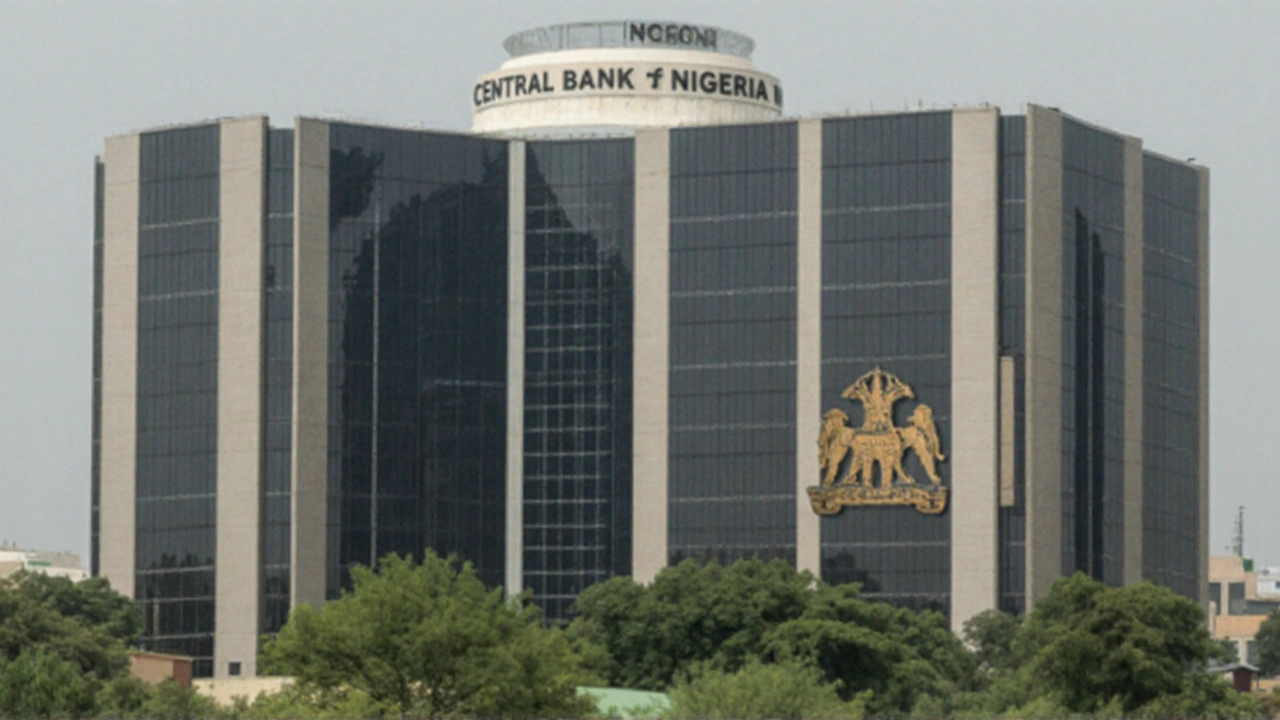Why the CBN decided to slash the benchmark rate
After a string of months where consumer prices cooled, the Central Bank of Nigeria finally felt comfortable enough to cut its key rate. Governor Olayemi Cardoso announced a 50‑basis‑point reduction, bringing the official rate down to 27 percent. The decision came out of a two‑day Monetary Policy Committee meeting in Abuja, where policymakers agreed that the recent slowdown in inflation gave them room to ease monetary pressure.
Cardoso pointed to five consecutive months of declining inflation as the main driver. With price gains easing, the central bank can afford to lower borrowing costs without immediately risking a rebound in inflation. The move signals a shift from the defensive stance the bank held for most of 2024, when it kept rates high to tame stubborn price rises.
In practical terms, a lower benchmark rate means cheaper loans for businesses and households. It also reduces the cost of capital for banks, which can pass on savings to borrowers. This is why many economists view the cut as the first step toward reviving economic activity that has been hampered by high financing costs.

Liquidity measures and the real‑estate ripple effect
Alongside the rate cut, the CBN lowered the Cash Reserve Requirement (CRR) for commercial banks from 50 % to 45 %. By freeing up a chunk of funds that banks previously had to hold in reserve, the central bank hopes to inject more liquidity into the financial system. More liquidity should translate into more credit being offered to firms needing working capital and to families looking for home loans.
At the same time, the regulator kept a stricter 75 % CRR on non‑TSA public‑sector deposits. This selective tightening shows the bank’s desire to control excess liquidity that could reignite price pressures, while still encouraging lending where it matters most.
The real‑estate market stands to benefit the most. High borrowing costs have long made mortgage rates soar into double‑digit territory, choking demand for both new builds and existing homes. With the benchmark rate now at 27 % and banks holding less cash in reserve, developers can expect lower financing costs for construction projects, and prospective homebuyers may finally see mortgage rates dip into more affordable ranges.
For the average Nigerian looking to buy a house, the prospect of a cheaper loan could mean the difference between renting indefinitely and securing a property. The housing shortage, which has pushed prices up sharply, might ease if developers can access cheaper funds and pass those savings on.
Across the continent, Nigeria is not alone in loosening monetary policy. Several African central banks have started cutting rates as inflation cools, marking a regional shift from the tight‑policy era that dominated the pandemic years. The CBN’s move aligns Nigeria with this broader trend, suggesting that policymakers are collectively confident that price pressures are receding.
While optimism is high, the bank remains cautious. The new Nigeria interest rate cut is only a first step; future adjustments will depend on whether inflation continues to drop and whether the increased credit flow translates into real economic growth without overheating the economy.
In the weeks ahead, market watchers will be looking at loan uptake rates, housing starts, and consumer spending data to gauge the real impact of the policy shift. If credit expands as intended, Nigeria could see a modest boost in activity that helps offset the slowdown caused by past inflationary shocks. The balance the CBN tries to strike—stimulating growth while guarding against new price spikes—will define the country’s economic trajectory for the rest of the year.

Linda Lawton
September 26, 2025 AT 06:13The CBN’s decision is being hailed as a miracle, but look beyond the glossy press release. What most people ignore is who benefits when the central bank loosens its grip. The shadowy elite financiers have been waiting for a chance to pry open the vault of cheap money. Suddenly, banks can flood the market with credit, and those with political connections will line up to scoop up the lowest rates. The average citizen, meanwhile, is left to wonder if their mortgage will ever become affordable. The narrative that this cut will spur growth is a comforting story fed to the masses. Yet every time a rate is cut, the real estate developers and multinational corporations see their profit margins swell. The ordinary Nigerian’s savings are eroded as inflation, though cooling, still gnaws at purchasing power. Moreover, the CBN’s selective CRR policy is a subtle tool to steer liquidity toward favored sectors. By keeping a tighter reserve on public‑sector deposits, the bank signals distrust of the very institutions it should be bolstering. This uneven playing field is a classic hallmark of a manipulated economy. Conspiracy theorists may call it a plot, but the data shows a pattern: rate cuts precede spikes in asset prices for the well‑connected. Meanwhile, small businesses continue to scramble for any loan, often at terms that barely cover the interest. If the credit does not translate into genuine job creation, the cut will be another footnote in a cycle of false optimism. The moral question remains: should a central bank gamble with the livelihoods of millions for the benefit of a privileged few? Until transparency is demanded and accountability enforced, this “hope” will stay out of reach for most.
Ashley Bradley
September 26, 2025 AT 06:46One might contemplate the underlying assumptions about growth embedded in such monetary maneuvers. While the author's optimism is palpable, prudence urges us to examine whether the credit expansion will truly penetrate the productive sector. The balance between stimulation and inflationary risk remains a delicate philosophical dilemma.
Joe Delaney
September 26, 2025 AT 07:20Looks like a modest move but it'll need real uptake
Ruben Vilas Boas
September 26, 2025 AT 07:53Totally agree the policy could help if banks actually pass the savings on to borrowers and not just pad their margins.
George Thomas
September 26, 2025 AT 08:26The reduction in the benchmark rate is a notable policy shift, yet its efficacy will depend on the subsequent behaviour of financial institutions. Observers should monitor the credit‑growth metrics closely to assess whether the intended stimulus materialises. A cautious approach is advisable given the lingering inflationary pressures.
Michelle Linscomb
September 26, 2025 AT 09:00While caution is fine, standing on the sidelines won’t fix the housing crunch – aggressive credit outreach is needed now, not later.